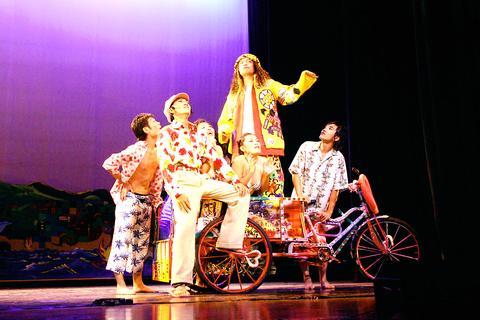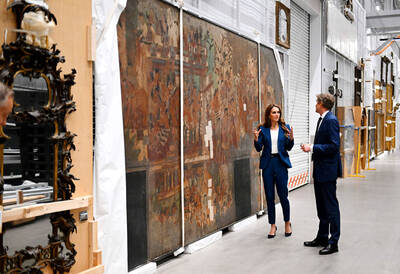I can't sing" is something you'll rarely hear a Taiwanese person say. Before the days of KTV, there was the golden era Taiwanese opera, go-a-hi (
Though Taiwanese opera no longer dominates the airwaves like it used to, it is by no means gone from the entertainment scene. This weekend, fans and first-timers alike can enjoy two very different manifestations of the genre: Eternal Love (

PHOTO COURTESY OF THE ARTISTS
Xu Ya-fen was born into Taiwanese opera. A passionate proponent and scholar of the genre, she operates her own theater -- Xu Ya-fen Fine Arts Opera (
Tomorrow's and Sunday's performances feature two more recently composed pieces -- the satirical tragicomedy Travesty of the Emperor (馬賢伏龍) and the story of Taiwan's Robin Hood, The Legend of Liao Tian-ding (廖俠添丁). While the cadence of Xu's singing voice may strike some as reminiscent of the famously acquired taste of Peking opera, the tempo and accompaniment are more lively and refreshing. Clips of Xu's music can be listened to at www.yafen.com.tw.
Though a distinct resemblance can be seen, Taiwanese opera is more accessible and folksy than its older cousin from Beijing. As Taiwanese opera developed, it appropriated the movement style, instruments, props and stage sets used in Peking opera. However, while the majority of Peking opera today remains true to the classical style,Taiwanese opera took in its stride the changes brought by modernization.
The 1960s were the golden era of Taiwanese opera radio broadcast, and later, in the early 1970s, televised Taiwanese opera began to dominate the home-entertainment scene. The rapid growth of Taiwan's commercial economy in the 1970s lead to a revolution in entertainment, opening the doors to foreign music, movies and TV.
"The thing about Taiwanese opera is that it has always been able to incorporate new elements," said Wang Rong-yu (王榮裕), the director of the "new" Taiwanese opera Tianlai and Yumei, when asked if his show could be considered as within the genre.
Tianlai and Yumei is a lighthearted Taiwanese version of West Side Story, where the Jets are Taiwanese-speaking drifters and strip-club owners and the Sharks are Chinese mobsters. Tianlai, a drifter, and Yumei, the favorite younger sister of a Chinese gangster are the two star-crossed lovers.
In outrageous costumes made of brilliantly colored Chinese silk, sequins, lace and pleather, the characters dance, spar and sing around the stage. This energetic production is sure to come across even to the viewer who understands neither Taiwanese nor Mandarin.
Performance notes:
What: Eternal Love
Where: Novel Hall, 3-1, Songshou Rd, Xinyi District, Taipei
When: Tonight, tomorrow and Sunday at 7:30pm
Tickets: NT$500 to NT$2,000, available online at www.yafen.com.tw or call (02)8787 8770.
What: Yumei and Tianlai
Where: National Taiwan Arts Education Center, 47, Nanhai Rd, Taipei (國立台灣藝術教育館,南海路47號)
When: Tonight and tomorrow at 7:30pm and Sunday at 2:30pm.
Tickets: NT$450 to NT$600, available online at www.artsticket.com.tw or by phone: 02-2623-7097

June 9 to June 15 A photo of two men riding trendy high-wheel Penny-Farthing bicycles past a Qing Dynasty gate aptly captures the essence of Taipei in 1897 — a newly colonized city on the cusp of great change. The Japanese began making significant modifications to the cityscape in 1899, tearing down Qing-era structures, widening boulevards and installing Western-style infrastructure and buildings. The photographer, Minosuke Imamura, only spent a year in Taiwan as a cartographer for the governor-general’s office, but he left behind a treasure trove of 130 images showing life at the onset of Japanese rule, spanning July 1897 to

One of the most important gripes that Taiwanese have about the Democratic Progressive Party (DPP) is that it has failed to deliver concretely on higher wages, housing prices and other bread-and-butter issues. The parallel complaint is that the DPP cares only about glamor issues, such as removing markers of Chinese Nationalist Party (KMT) colonialism by renaming them, or what the KMT codes as “de-Sinification.” Once again, as a critical election looms, the DPP is presenting evidence for that charge. The KMT was quick to jump on the recent proposal of the Ministry of the Interior (MOI) to rename roads that symbolize

On the evening of June 1, Control Yuan Secretary-General Lee Chun-yi (李俊俋) apologized and resigned in disgrace. His crime was instructing his driver to use a Control Yuan vehicle to transport his dog to a pet grooming salon. The Control Yuan is the government branch that investigates, audits and impeaches government officials for, among other things, misuse of government funds, so his misuse of a government vehicle was highly inappropriate. If this story were told to anyone living in the golden era of swaggering gangsters, flashy nouveau riche businessmen, and corrupt “black gold” politics of the 1980s and 1990s, they would have laughed.

Imagine being able to visit a museum and examine up close thousand-year-old pottery, revel alone in jewelry from centuries past, or peer inside a Versace bag. Now London’s V&A has launched a revolutionary new exhibition space, where visitors can choose from some 250,000 objects, order something they want to spend time looking at and have it delivered to a room for a private viewing. Most museums have thousands of precious and historic items hidden away in their stores, which the public never gets to see or enjoy. But the V&A Storehouse, which opened on May 31 in a converted warehouse, has come up